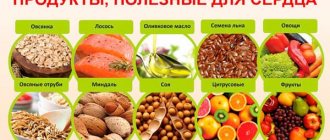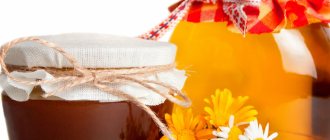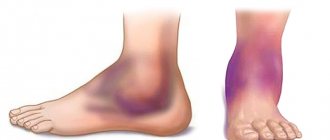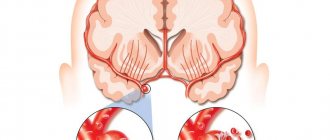All processes occurring in our body directly depend on the normal functioning of blood vessels. It is through them that blood and lymph flow; without them, human existence is simply impossible.
All vessels are divided into lymphatic and blood vessels. Lymph flows through lymphatic vessels, arterial and venous blood flows through blood vessels.
Arterial vessels (arteries) have a high tone, and the blood moving through them flows very quickly in the direction from the heart to the periphery. Venous vessels (veins), through which blood flows in the opposite direction, on the contrary, are relaxed and so that the blood does not stagnate, they have venous valves.
Arteries play the role of a transport vehicle for blood enriched with oxygen and nutrients. Venous vessels, returning back, carry blood saturated with metabolic products.
This is interesting:
The total length of blood vessels is 100 thousand kilometers. Over the course of 50 years, over 175,000,000 liters of blood pass through them. The speed of blood movement (through arteries) is 40 km per hour!
How should you eat?
Products for blood vessels and the heart should help lower blood pressure, reduce swelling, and eliminate shortness of breath. Nutrition should prevent the development of atherosclerosis, heart attack and stroke.
The diet should include foods that cleanse the blood vessels of the brain and strengthen the heart muscle. They must contain:
- potassium is an essential trace element that removes fluid, reduces blood pressure, improves heart function and regulates its rhythm;
- dietary fiber – removes heavy metal salts and prevents bad cholesterol from being absorbed in the gastrointestinal tract;
- magnesium – dilates blood vessels in the brain, reduces blood pressure, prevents the development of spasms;
- polyunsaturated omega-3 and omega-6 fatty acids;
- calcium – helps remove cholesterol;
- folic acid – prevents the development of cerebral atherosclerosis;
- vitamin A – strengthens capillary walls;
- B vitamins (B1 regulates heart contraction, B6 relieves vascular spasms);
- Vitamin E – prevents thrombus formation, relieves vascular inflammation.
Foods good for the heart and blood vessels
Nutritionists advise eating more often (up to 5-6 times a day), but in small portions. At night it is useful to drink kefir, which speeds up the digestion process and helps eliminate harmful substances.
For breakfast, it is recommended to eat complex carbohydrates: durum wheat pasta, grain bread, cereals. For lunch and dinner - poultry, fish, seafood, cottage cheese. For drinks, preference should be given to plain water, green tea, herbal infusion, and natural juices without sugar.
Cardiologists believe that people with heart and cerebral vascular diseases should adhere to a Mediterranean diet, that is, seafood, fish, vegetables, fruits, herbs, and olive oil should be included in the diet. Salt should be reduced as much as possible so that fluid is not retained in the body and blood pressure does not increase. It is advisable to give up animal fats, which not only increase the level of bad cholesterol and damage blood vessels, but also contribute to weight gain.
Beverages
For varicose veins, it is recommended to drink the following drinks:
- Green tea.
Green tea for varicose veins
- Fruit and vegetable juices. The juice of chokeberry, sea buckthorn and black currant is especially useful.
- Cranberry and lingonberry fruit drinks.
- Compotes.
Expert opinion
To prevent the development of complications of varicose veins, as well as to treat this disease in its early stages of development, you can use Normaven® Leg Cream. This product was developed by specialists from the pharmaceutical company VERTEX, has undergone clinical studies that have proven its high effectiveness and has a full list of necessary documents and quality certificates.
Vascular surgeon, phlebologist
Osipova Ekaterina Yakovlevna
The best foods for the heart and blood vessels
This list includes products that clean blood vessels and strengthen the heart muscle. Most of them are of plant origin.
Garlic
Cardiologists believe that one clove of garlic a day reduces the risk of developing heart and vascular diseases. The hydrogen sulfide and nitric oxide contained in it reduce vascular tone, resulting in a drop in blood pressure. In addition, garlic is a natural antibiotic that protects the body from acute respiratory viral infections and influenza.
Grapefruit
Contains glycosides that normalize digestive processes, prevent the development of atherosclerosis, and improve the functioning of the heart and vascular system.
Whole grains
Whole grains contain a very heart-healthy element - potassium. Porridge, bran, and products made from wholemeal flour help remove cholesterol from the body.
Apples
It is useful for people with cardiovascular disorders to eat apples and even arrange apple fasting days to avoid gaining excess weight. Pectin and vegetable fiber help get rid of cholesterol and increase the elasticity of blood vessels. Apples are a source of microelements and vitamins.
Pomegranate
Doctors consider pomegranate one of the best foods for the heart and blood vessels. This fruit thins the blood, lowers cholesterol levels, and clears plaque from blood vessels. It is recommended to eat pomegranate fresh.
Pomegranate is an indispensable product for vascular and cardiac pathologies.
Tomatoes
They are rich in magnesium, which strengthens the heart muscle, and the antioxidant lycopene, which maintains the tone of blood vessels.
Salmon and salmon
The high content of omega-3 fatty acids makes these types of fish indispensable for maintaining healthy blood vessels and the heart. Regular consumption of salmon reduces the likelihood of developing a heart attack, normalizes blood pressure and blood clotting. Salmon contains the antioxidant astaxanthin, which helps preserve memory for many years.
Nuts
The healthiest ones are almonds and walnuts. They contain the most monounsaturated fats. Nuts quickly satisfy hunger and help absorb fiber.
Oatmeal
Oatmeal in the morning saturates the body with folates, potassium, and omega-3 fatty acids. Oatmeal keeps blood vessels toned and helps lower cholesterol.
Olive oil
Doctors have long noticed that in countries where exclusively olive oil is used for cooking, the mortality rate from heart attacks is very low. Monounsaturated fats contained in oil help get rid of cholesterol plaques and fight blood clots. Virgin oil is especially useful.
Berries
Reduce the risk of developing pathologies of the heart and blood vessels. You can eat any berries to your taste: strawberries, blueberries, blackberries, raspberries, strawberries, cherries, black and red currants and others.
Fresh berries should be present in the diet of heart patients
Pumpkin
Pumpkin contains beta-keratin, potassium, and vitamin C, which prevent the development of atherosclerosis. It normalizes blood pressure and water-salt balance, cleanses blood vessels.
Soybeans
Supplies proteins to the body and lowers the level of bad cholesterol. You need to use only natural, but not genetically modified products.
bitter chocolate
Chocolate with a cocoa content of at least 70% is good for the heart. Thanks to the flavonoids found in cocoa beans, it improves the quality of blood cells, prevents blood clots and thus reduces the likelihood of developing cardiovascular diseases. But it is not recommended to eat more than two or three pieces of chocolate a day.
Dark chocolate reduces the risk of developing cardiovascular diseases
Mushrooms
They contain ergotianine, an antioxidant that stimulates the immune system, improves blood composition, and prevents the development of vascular and heart diseases. In addition, mushrooms contain a lot of vitamin B and D, fiber, protein, magnesium, phosphorus, potassium, iron, zinc, manganese, and selenium.
Seeds
To strengthen the heart muscle and blood vessels per day, it is enough to eat one handful of seeds, which contain omega-3 and omega-6 fatty acids.
Legumes
Lentils, beans and chickpeas are especially healthy. They are rich in fiber, calcium, omega-3 fatty acids.
Avocado
To reduce bad cholesterol and increase good cholesterol, you need to constantly add pieces of this exotic fruit to salads and meat dishes. Avocado contains enzymes that help absorb carotenoids.
Avocado is a fruit that is good for blood vessels and the heart.
Linseed oil
It contains omega-6 and omega-3 fatty acids. It can be used for cooking or added to food in small quantities, such as salads or cereals.
#1: Blueberries
Blueberries are one of the greatest gifts of nature known to man at all times. It is simply irreplaceable for all people prone to varicose veins. Thanks to their high concentration of anthocyanins (flavonoid pigments), blueberries help restore the collagen matrix of the vascular wall by removing free radicals and neutralizing enzymes that destroy connective tissue. Flavonoids also restore damaged proteins that form the framework of the venous wall. Moreover, blueberries are a good source of fiber such as pectin. Among all berries, blueberries are one of the best sources of vitamin E.
Harmful products
It is important to know not only about foods that are good for the heart and blood vessels, but also about foods that are harmful. If you have heart disease, it is necessary to limit the consumption of some foods, and it is advisable to avoid some completely. Doctors consider the following to be harmful:
- Salt. When consumed in excess, blood pressure increases, and this negatively affects the condition of blood vessels. Salt retains fluid, which increases the load on the heart.
- Fried food. Leads to the deposition of cholesterol on the walls of blood vessels and increases blood pressure.
- Meat. According to doctors, frequent use may cause problems with the heart and blood vessels. There is no need to completely give up meat (veal, lean beef, poultry), but you should eat it no more than twice a week.
- Alcoholic drinks. They cause vascular spasms, which can lead to oxygen starvation.
- Products with preservatives. The harmful substances they contain worsen the condition of the walls of blood vessels.
- Strong coffee and tea.
- Carbonated drinks.
- Sugar and confectionery.
Malysheva: Food against atherosclerosis of the vessels of the lower extremities. How to lower cholesterol? - Video
is not responsible for the accuracy of the information presented in this video clip. Source – Healthy Life
Sources:
- LIPOPROTEIN METABOLISM AND ATHEROSCLEROSIS. Panin L.E. // Siberian scientific medical journal. – 2006. – No. 2 (120). – pp. 15-22.
- PROMISING DIRECTIONS FOR USING GREEN TEA AS A BIOLOGICALLY ACTIVE SUBSTANCE IN FOOD TECHNOLOGY. Lukin A.A. // Bulletin of the South Ural State University. Series: Food and biotechnology. – 2015. – No. 2. – P. 5-9.
- PROPER NUTRITION AS A KEY TO HEALTH AND LONGEVITY. Tarasova N.S., Lavrenchuk A.A. // Pedagogy, psychology and medical and biological problems of physical education and sports. – 2008. //https://cyberleninka.ru/article/v/pravilnoe-pitanie-kak-zalog-zdorovya-i-dolgoletiya
- https://www.physicsforums.com/threads/dieting-nutrition-and-the-scientific-method.617399/
- https://www.livestrong.com/article/131910-supplements-that-strengthen-arteries-blood-vessels/
For an accurate diagnosis, contact a specialist.
The main principles of healthy eating
- Limit consumption of animal fats. Include only lean meat (beef, veal, white poultry) in moderation in your diet.
- Reduce the amount of dairy products.
- Vegetable side dishes should be prepared for breakfast, lunch and dinner. They should make up half the serving. To prepare, use several types of vegetables that can be baked, stewed or boiled.
- Your diet must include foods containing omega-3 fatty acids. They are found in fish, seeds, nuts, and vegetable oil.
- Limit salt so that fluid does not retain in the body and there is no unnecessary stress on the heart.
- Avoid fried, smoked and spicy foods.
- Avoid alcohol, caffeine, canned and refined foods.
#2: Watercress (Watercress, Lepidium sativum)
This is an ancient plant, about which some people say “I love it,” others say “I hate it.” Watercress is a real super hero among salads. It has been used since ancient times for the treatment and prevention of a wide range of ailments. Hippocrates, the father of medicine, called watercress “the medicine of medicines” and grew it near his home to treat patients. In modern herbal medicine, watercress is often recommended for people with varicose veins. Watercress can't be found in every supermarket, but you can grow your own if you have a summer house or vegetable garden. Thanks to its unique tangy flavor, watercress can be the highlight of a vegetable salad, added to a sandwich, or sometimes even pureed.
#4: Rosemary
Rosemary stimulates blood circulation and thus can be useful in treating varicose veins. Rosemary contains rosmarinic acids and plant polyphenols, which protect tissue from free radical damage. It also contains ursolic acid, which strengthens capillaries. Rosemary can be used to cook fish, fried meat, etc. It is added to sauces and goes well with various fruits, such as orange. Rosemary extracts are increasingly being added to various skin care products, including those intended to treat varicose veins.
#5: Ginger
Even before the term "superfood" was coined, ginger has been known for centuries for its aroma, tart taste, and health-promoting properties. In herbal medicine, ginger is often used to treat varicose veins because its ability to dissolve fibrin in blood vessels improves blood circulation. In people with varicose veins, fibrin breakdown processes are often disrupted, which leads to a loss of elastic properties of the venous wall. Consuming fresh ginger is believed to be most effective, and fortunately it is available in supermarkets all year round.
#7: Asparagus
If you are concerned about varicose veins, asparagus is an excellent herbal food that should be on your shopping list. Asparagus helps strengthen veins and capillaries, preventing them from damage. Like avocados, asparagus does not accumulate pesticides and other chemicals well, even when grown with organic fertilizers. When preparing asparagus, make sure you thoroughly remove fiber from the shoots (unless they are already young), especially the lower part of the shoots, located at the root.
#6: Beetroot
Regular inclusion of beets in your diet can help prevent varicose veins. Betacyanins, the phytochemicals responsible for the intense red color of beets, are known to significantly reduce homocysteine levels. Homocysteine is an amino acid that can cause damage to blood vessels. Elevated homocysteine levels are one of the most powerful risk factors for venous thrombosis. Not many people know, but green beet tops are also edible and very nutritious, so don't throw them away, add them to your salad.
#3: Avocado
Avocados are full of natural compounds that help fight varicose veins. This fruit, and perhaps also a vegetable (the debate still continues), contains large amounts of vitamin C and E, two key elements that support healthy blood vessels. Avocado is also one of the top 10 foods with high concentrations of glutathione and tripeptide molecules. These compounds protect the heart, veins and arteries from damage by oxygen radicals. Glutathione is essential for vitamins C and E to function properly. Another bonus of this food is that avocados contain fewer pesticides and other harmful chemicals.
Watch your weight
To avoid increased stress on the vessels of the legs, it is important to monitor your weight. For those who are prone to obesity, you need to minimize fatty, floury, sweet foods, salty, spicy and smoked foods; rich meat broths, marinades, smoked meats, canned food - they indirectly contribute to the destruction of vascular walls and valves.
Your care and attention to health, following simple nutritional recommendations, as well as preventive visits to a phlebologist will help preserve the beauty of your legs, which always evokes the admiring glances of men.






